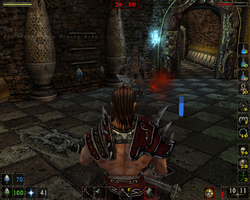Moral Grey Areas in Dragon Age
Moral Grey Areas in Dragon Age
Editorial - posted by VentilatorOfDoom on Mon 22 March 2010, 18:55:21
Tags: BioWare; Dragon Age: Originsget examined by GreyWardens.com.
<p style="margin-left:50px;border-style:solid;border-width:1px;border-top-color:#ffffff;padding:5px;border-right-color:#bbbbbb;border-left-color:#ffffff;border-bottom-color:#bbbbbb;">DA:O makes being all good or all evil extremely difficult. There is no system to reward good decisions (or evil ones), unlike the BioWare RPGs that have preceded it. In the Mass Effect world, you have the Paragon/Renegade scale. The closer to each extreme you fall, the greater number of options you’ll have in dialogue. In Star Wars: Knights of the Old Republic, there’s the Light Side/Dark Side of the force, and choosing one opens up new abilities. The decisions in DA:O themselves are not so clearly bad or good. Often something that seems like a good decision at the time has unexpected, dark consequences. One word: Landsmeet.
One of the first decisions a player has to make after surviving Ostagar is whether to enlist the aid of a warrior who was imprisoned for killing an entire family, even the children. During my first DA:O playthrough (which, I will readily admit, was full of fail — I didn’t even find Leliana!), I decided that it would be worthwhile to recruit Sten into my motley crew, even though I was playing a generally good little elven mage and his admission of murder was unsettling. I proceeded to the Chantry to convince the Revered Mother to let him go, and got my first taste of a good person doing a not-so-good thing when the only option I had was to intimidate the priestess. Alistair didn’t appreciate that. Come to think of it, he didn’t really like me much that playthrough.
Is BioWare-personality-larping getting more grey? Moral grey?
Spotted at: GB
<p style="margin-left:50px;border-style:solid;border-width:1px;border-top-color:#ffffff;padding:5px;border-right-color:#bbbbbb;border-left-color:#ffffff;border-bottom-color:#bbbbbb;">DA:O makes being all good or all evil extremely difficult. There is no system to reward good decisions (or evil ones), unlike the BioWare RPGs that have preceded it. In the Mass Effect world, you have the Paragon/Renegade scale. The closer to each extreme you fall, the greater number of options you’ll have in dialogue. In Star Wars: Knights of the Old Republic, there’s the Light Side/Dark Side of the force, and choosing one opens up new abilities. The decisions in DA:O themselves are not so clearly bad or good. Often something that seems like a good decision at the time has unexpected, dark consequences. One word: Landsmeet.
One of the first decisions a player has to make after surviving Ostagar is whether to enlist the aid of a warrior who was imprisoned for killing an entire family, even the children. During my first DA:O playthrough (which, I will readily admit, was full of fail — I didn’t even find Leliana!), I decided that it would be worthwhile to recruit Sten into my motley crew, even though I was playing a generally good little elven mage and his admission of murder was unsettling. I proceeded to the Chantry to convince the Revered Mother to let him go, and got my first taste of a good person doing a not-so-good thing when the only option I had was to intimidate the priestess. Alistair didn’t appreciate that. Come to think of it, he didn’t really like me much that playthrough.
Is BioWare-personality-larping getting more grey? Moral grey?
Spotted at: GB














